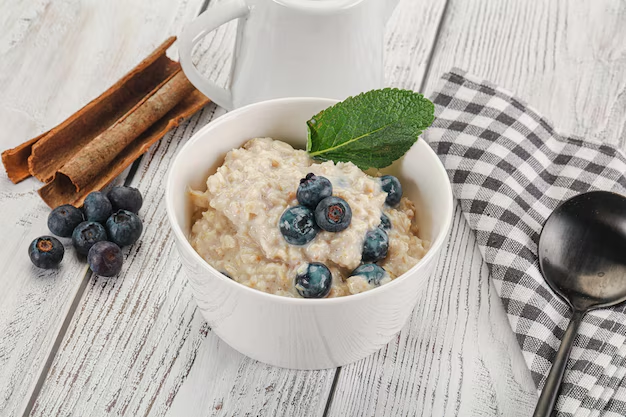Your Guide to Can Diabetics Eat Oatmeal
What You Get:
Free Guide
Free, helpful information about Diabetes FAQ and related Can Diabetics Eat Oatmeal topics.
Helpful Information
Get clear and easy-to-understand details about Can Diabetics Eat Oatmeal topics and resources.
Personalized Offers
Answer a few optional questions to receive offers or information related to Diabetes FAQ. The survey is optional and not required to access your free guide.
Can People with Diabetes Enjoy Oatmeal Without Worry?
Oatmeal has long been heralded as a staple of the healthy breakfast arena, famed for its heart-healthy benefits and its ability to keep you full for hours. But when managing diabetes, a balanced meal plan is key. You may wonder: can people with diabetes confidently include oatmeal in their diet? The short answer—yes, with some considerations in mind.
Understanding Oatmeal's Impact on Blood Sugar
Oatmeal is a complex carbohydrate, meaning it's broken down slowly in the body, compared to refined carbohydrates. This slow digestion leads to a more gradual rise in blood sugar levels. Plus, its high fiber content, particularly in steel-cut or rolled oats, helps further moderate blood sugar spikes.
Key Points for Diabetics:
- Opt for Less Processed Oats: Steel-cut or rolled oats are less processed than instant oats. The less processing involved, the more beneficial fiber remains, which helps in better blood sugar control.
- Watch the Portions: Even healthy carbs need portion control. A typical serving is half a cup of dry oats, which supplies about 27 grams of carbohydrates.
- Beware of Add-Ins: Make it a healthy bowl by avoiding sugary additives. Instead, enhance flavor with spices like cinnamon or add natural sweetness with a small amount of fresh fruit.
Enhancing Oatmeal with Better Choices
Instead of simple carbohydrates or sugar-laden toppings, try adding nutrient-rich ingredients:
- Nuts or Seeds: Almonds, chia seeds, or flaxseeds add a crunchy texture while boosting protein and healthy fats.
- Berries: Blueberries or strawberries provide sweetness along with valuable vitamins and antioxidants.
- Greek Yogurt: Adds creaminess and packs a protein punch, which further helps stabilize blood sugar levels.
The Bigger Picture: Nutritional Guidance & Support
With a myriad of dietary options, managing diabetes is about balancing meals to ensure slow energy release and maintaining stable blood sugar. The integration of government and community nutritional support can facilitate this balance. Programs by authorities often provide educational resources and financial aid for nutritional needs. Consulting with a dietitian or participating in community nutrition classes can arm you with practical, personalized eating plans.
Exploring Broader Support Tools
Managing diabetes extends beyond dietary choices. Understanding available financial and educational resources can significantly assist in managing healthcare costs:
- Government Healthcare Assistance: Programs like Medicaid or Medicare provide crucial assistance for eligible individuals facing healthcare expenses.
- Diabetes Educational Services: Local clinics and health departments frequently offer workshops, nutritional guidance sessions, and other forms of education.
- Disability Benefits: Social Security Disability Insurance (SSDI) can be a potential aid if diabetes severely impacts your ability to work.
- Nutritional Grants: Certain community organizations or nonprofits offer grants or food programs focusing on healthy diet needs.
Financial Assistance & Resources for Managing Diabetes
Here's a streamlined list of resources that could assist:
- 💰 Medicaid & Medicare: Health coverage programs for low-income individuals and seniors.
- 📚 Diabetes Nutritional Education: Local classes and workshops for healthy meal planning.
- 🩺 Social Security Disability Insurance (SSDI): Potential financial aid for those with severe complications.
- 🥗 Community Food Programs: Grants and food banks providing healthy dietary options.
- 🏦 Nonprofit Support: Organizations offering educational resources and support for diabetes management.
Embracing oatmeal as part of a balanced diet can be a wholesome choice for diabetics when integrated wisely. Coupled with informed financial decisions, navigating the path to a healthier lifestyle becomes both attainable and sustainable.
What You Get:
Free Diabetes FAQ Guide
Free, helpful information about Can Diabetics Eat Oatmeal and related resources.

Helpful Information
Get clear, easy-to-understand details about Can Diabetics Eat Oatmeal topics.

Optional Personalized Offers
Answer a few optional questions to see offers or information related to Diabetes FAQ. Participation is not required to get your free guide.


